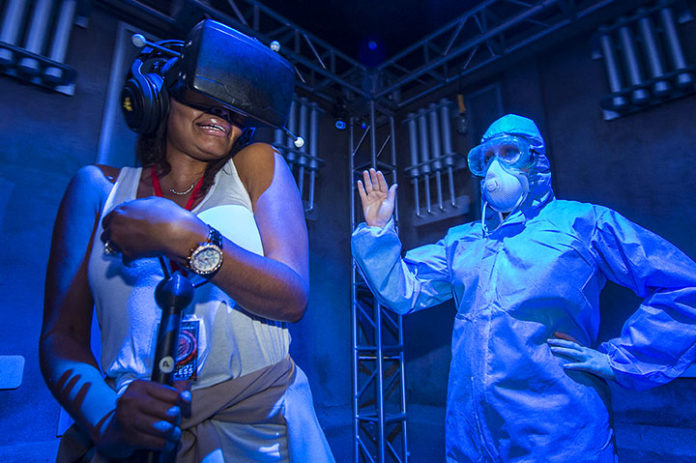
By Kelsea Willenbrock | Reporter
Until recently, virtual reality technology was just a “what if” question. Baylor University graduate students and professors are exploring “what if” possibilities with different virtual reality technologies and are researching their potential applications.
Baylor’s film and digital media department, along with the computer science department, has created a major where students explore how virtual reality video games change the gaming experience.
“We combine the strengths of faculty in both departments to produce some really excellent future game designers,” said Dan Shafer, associate professor in the department of film and digital media.
The major, called game development, focuses on learning about the software that goes into gaming and the technology associated with it. Students coming out of this major acquire knowledge in both areas.
“My experience is that students in computer science who have some media background go out of school and start at higher salaries than their peers,” said Dr. Michael Korpi, a professor in the film and digital media department.
In addition to the partnership with the computer science department, graduate students studying film and digital media have the opportunity to interact with the virtual reality technology and software as they learn how it works.
“We are always looking for what the next technology changes are going to be,” Korpi said.
Dr. Corey Carbonara, professor of film and digital media and senior research fellow, works with the students and the various virtual reality technologies that the department has available.
“We have some experiences where you can go to a real roller coaster and put that [virtual reality] experience on and experience it yourself,” Carbonara said. “You have this added dimension where you feel all the timing of what you are moving through, and it will bring you into another world, so that’s an interesting mixed reality.”
While students are intrigued by the technology and the potential it has to affect daily life, Shafer is not sure it will affect much more than gaming in the long run.
The virtual reality research that Carbonara and Shafer work on has also had an influence beyond Baylor’s campus. Other professors at the university, including Korpi, take the research and share it with technology, gaming and film companies across the nation.
While studying at Baylor, students have the opportunity to work with professionals and innovative technology that will help them in their own professional careers.
“The new frontier is really exciting, but we’re really excited about the fact that there is an acknowledgement from the industry that we actually are a place of research that they want to partner with,” Carbonara said.





